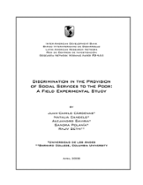Discrimination in the Provision of Social Services to the Poor: A Field Experimental Study
Date
Apr 2008
This paper uses an experimental field approach to investigate the pro-social preferences and behavior of social services providers and the behavior of potential beneficiaries in Bogota, Colombia. Field experiments were conducted using games including a newly designed Distributive Dictator Game in order to examine traits and mechanisms guiding pro-sociality. Replicating the patterns of previous studies, individuals showed a preference for fair outcomes, positive levels of trust and reciprocity, and willingness to punish unfair outcomes. The results provide evidence that the poor trigger more pro-social behavior from all citizens, including public servants, but the latter display strategic generosity. Additional observations include a bias in favor of women and households with more dependents, but discriminatory behavior against stigmatized groups.



